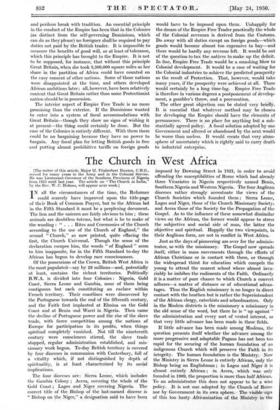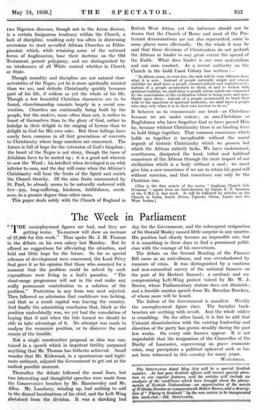The Church in West Africa
[The writer of this article, Major U.. Fitzherbert Buxton, C.M.G., served for Many years in the ArmY and in the Colonial Service. He was Lieutenant-Governor of the Southern Provinces of Nigeria from 1925 until last year. The article on " The Church in India," by the Rev. W. C. Holmes, will appear next week.]
IN all the circumstances of the time, the Reformer -I- could scarcely have improved upon the title-page of thcir Book of Common Prayer, but to the African lad in the Fifth Standard it must be a perplexing document. The lion and the unicorn are fairly obvious to him ; these animals are doubtless totems, but what is he to make of the wording : " . . . Rites and Ceremonies of the Church according to the use of the Church of England," the second " Church," as now printed, quite effacing the first; the Church Universal. Though the sense of the declaration escapes him, the words " of England " seem to him inapposite, for in the Fifth Standard to-day the African has begun to develop race consciousness.
Of the possessions of the Crown, British West Africa is the most populated—say by 23 millions—and, potentially at least, contains the richest territories. Politically B.W.A. is divided into four Colonies : Nigeria, Gold Coast, Sierra Leone and Gambia, none of them being contiguous but each constituting an enclave within French territory. Their coastlines were discovered by the Portuguese towards the end of the fifteenth century, and the Faith first implanted at Elmina on the Gold Coast and at Benin and Warri in Nigeria. Then came the decline of Portuguese power and the rise of the slave trade, with fierce competition among the nations of Europe for participation in its profits, when things spiritual completely vanished. Not till the nineteenth century were consciences stirred, the slave trade stopped, regular administration established, and mis- sionary work begun. To-day British territory is covered by four dioceses in communion with Canterbury, full of a vitality which, if not distinguished by depth of spirituality, is at least characterized by its social implications.
The four dioceses are : Sierra Leone, which includes the Gambia Colony ; Accra, covering the whole of the Gold Coast ; Lagos and Niger covering 'Nigeria. The correct title of the Bishop of the last-named diocese is " Bishop on the' Niger," a designation said to have been imposed by Downing Street in isn, in order to avoid offending the susceptibilities of Rome which had already three Vicariates in Nigeria respectively named Benin, Southern Nigeria and Western Nigeria. The four Anglican dioceses rather strongly'accentuate the views of the Church Societies which founded them ; Sierra Leone, Lagos and Niger, those of the Church Missionary Society, and Accra those of the Society for the Propagation of the Gospel. As to the influence of these somewhat dissimilar views on the African, the former would appear to stress the subjective and social side of man, the latter' the objective and spiritual. Happily the two viewpoints, in their Anglican form, are not in conflict in West Africa.
Just as the days of pioneering are over for the adminis- trator, so with the missionary. The Gospel now spreads itself, either in mass movements through the efforts 'of African Christians or in contact with them, or through the widespread thirst for education which compels the young to attend the nearest school where almost inva- riably he imbibes the rudiments of the Faith. Ordinarily it is a matter' of pure chance to which Church a convert adheres—a matter of distance or of educational advan- tages. Thus the English missionary is no longer in direct contact with the heathen but is rather the Superintendent of the African clergy, catechists and schoolmasters. Only in the Moslem districts is the missionary a missionary in the old sense of the word, but there he is " up against " the administration and every sort of vested interest, so that very little advance has been made in these fields.
If little advance has been made among Moslems, the question presents itself whether the advance among the more progressive and adaptable Pagans has not been too rapid for the securing of the human foundation of an indigenous Church which will preserve the Faith in its integrity. The human foundation is the Ministry. Now the Ministry in Sierra Leone is entirely African, only the Bishop being an Englishman ; in Lagos and Niger it is almost entirely African ; in Accra, which was only founded in 1909, the proportion is more than half African. To an administrator this does not appear to be' a wise policy. It is not one adopted by 'the Church of Rome nor. by. Government- in its own sphere. The visible sign of this too hasty Africanization of the Ministry in -the two Nigerian dioceses, though not in the Accra dioCese, is a certain fissiparous tendency within the Church, a lack of discipline, resulting only too often in distressing secessions to • start so-called African Churches or Ethio- pianism which, While retaining some of the outward forms of Anglicanism, base their' doctrine on the Old Testament, permit polygamy, and are distinguished by an intolerance of all White control whether in Church or State.
- Though morality and discipline are not natural char- acteristics of the Negro, yet he is more spiritually minded than we are, and definite Christianity quickly becomes part of his life, if seldom as yet the whole of his life. Though a feW beautiful Christian characters are to be found, churchliaanship consists largely in a social con- iention. Churches are continually being built by the people, but the motive, more often than not, is rather to boast of themselves than to the glory of God, rather to indulge in their delight in the singing of hymns than to delight in God for His own sake. But these failings have surely been common in all first generations of converts to Christianity where large numbers are concerned. The future is full of hope for the extension of God's kingdom ; the heart of the Negro is not stony, though the tares of fetishism have to be rooted up ; it is a good soil wherein to sow the Word ; his intellect when developed is no whit inferior to ours, and the day will come when the African's Christianity will bear the fruits of the Spirit and enrich the Church thereby. Of the nine fruits enumerated by St. Paul, he already seems to be naturally endowed with five—joy, long-suffering, kindness, faithfulness, meek- ness, to a greater degree than other races. • This paper deals solely with the Church of England in British West Africa, yet the inference should not be drawn that the Church of Rome- and most of the Pro- testant denominations are not also represented, some 'in some places more effectually. On the whole it may be said that these divisions of Christendom do not perturb the African or hinder to any great extent the spread of the Faith. What does hinder is our own materialism and our own conduct. As a recent authority on the Church in the Gold Coast Colony has written :— " In fifteen years, or even ten, the task will be very different from what it is now. Instead of people naturally simple and almost childlike we shall have a people commercialized and sophisticated ; instead of a people accustomed to think of and to reckon with spiritual realities, we shall have a people whose minds are coarsened by the materialism of the civilization which is being more and morn thrust upon them ; instead of a people accustomed to bend their wills to the sanctions of spiritual authority, wo shall have a people
who obey only when it is to their own interest to do so." .
It behoves us to consummate our trust—as Christians because we are under orders ; as non-Christians or Englishmen who have forgotten God or have passed Him by, because without Christianity there is no binding force to hold things together. That common conscience which holds us together is inexplicable without the moral deposit of historic Christianity which we possess but which the African entirely lacks. We have undermined, overthrown, dissipated the local, tribal and habitual conscience of the African through the mere impact of our civilization which is a body without a soul ; we must give him a new conscience if we are to retain his good will without coercion, and that . conscience can only be the Christian one.
[This is the first article of the series " Anglican Church Life Overseas "—apart from an Introduction by Canon E. F. Spanton of the U.M.C.A. last week. It will be followed by articles on the Church in India, SOuth Africa, Uganda, China, Japan and tho West Indies.]







































 Previous page
Previous page